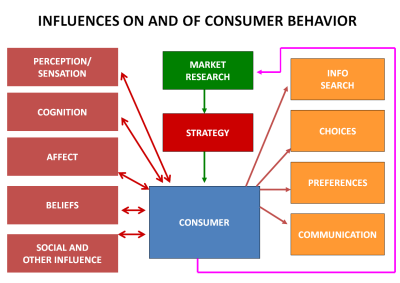The Psychology of Consumer Behavior
Introduction
Consumer behavior is the study of how individuals make decisions to spend their available resources (time, money, effort) on consumption-related items. Understanding the psychology behind consumer behavior can help businesses tailor their marketing strategies and help consumers make more mindful purchasing decisions.
How Psychological Principles Influence Buying Decisions
Perception: Perception is the process by which consumers select, organize, and interpret information. It influences how consumers see products and brands. For instance, packaging, color, and design can affect a consumer’s perception of a product's quality and value.
Motivation: Motivation drives consumer behavior. Theories such as Maslow's hierarchy of needs suggest that consumers' buying decisions are influenced by their current needs, from basic necessities to self-fulfillment.
Learning and Memory: Past experiences influence future purchasing decisions. Consumers rely on their memory and learned information, such as brand recognition and past satisfaction, when making choices.
Attitudes and Beliefs: These shape how consumers feel about products and brands. Positive attitudes and beliefs can lead to brand loyalty, while negative ones can deter purchases.
Social Influence: Social factors such as family, friends, and social media can significantly impact buying decisions. Consumers often look to others for validation and advice.
The Impact of Advertising and Marketing on Consumer Behavior
Emotional Appeal: Advertising often uses emotional triggers to connect with consumers on a deeper level. Emotions like happiness, fear, and nostalgia can drive consumers to make purchases.
Persuasion Techniques: Marketing employs various persuasion techniques such as scarcity ("limited time offer"), social proof (testimonials and reviews), and authority (endorsements by experts or celebrities) to influence consumer decisions.
Brand Positioning: Effective branding positions a product in the consumer's mind as the best choice. This includes creating a unique value proposition and a strong brand identity.
Targeted Advertising: With the advent of digital marketing, ads can be tailored to specific demographics, interests, and behaviors, increasing their effectiveness.
Consumer Trends: Marketing strategies often capitalize on current trends and cultural movements, making products more appealing by aligning them with consumer values and lifestyles.
Techniques for Making Mindful Purchasing Decisions
Awareness of Influences: Being aware of the psychological tactics used in advertising can help consumers make more informed decisions. Recognizing emotional triggers and persuasion techniques can reduce impulsive buying.
Setting Budgets: Establishing a clear budget can help consumers prioritize their spending and avoid unnecessary purchases.
Research and Comparison: Taking time to research products and compare options can lead to better purchasing decisions. This includes reading reviews, checking ratings, and comparing prices.
Needs vs. Wants: Distinguishing between needs and wants can prevent overspending. Consumers should evaluate whether a purchase is essential or a luxury.
Sustainable Choices: Considering the environmental and social impact of products can lead to more responsible purchasing decisions. This includes looking for sustainable and ethically-produced goods.
Delay Gratification: Waiting before making a purchase can help determine if it is truly necessary. This practice can reduce impulse buying and increase satisfaction with purchases.
Conclusion
Understanding the psychology of consumer behavior is essential for both businesses and consumers. For businesses, leveraging psychological principles in advertising and marketing can lead to more effective strategies and increased sales. For consumers, being aware of these principles can lead to more mindful and satisfying purchasing decisions. By recognizing the factors that influence buying behavior and employing techniques to make thoughtful choices, consumers can achieve greater satisfaction and financial well-being.


